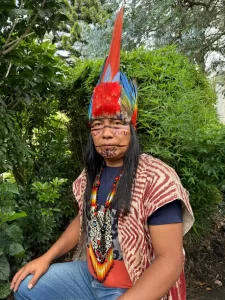Day of the Dead
By Dave Skinner, [email protected] | Le Jardin Ombragé, Tallahassee, Florida, USA http://www.gingersrus.com
For most non-Latin Americans, the “Day of the Dead,” if they have heard about it at all, is some mysterious celebration with dark connotations. By many, it is thought of as having some connection to Halloween, and I would not be surprised, if nowadays, some would think it has to do with zombies in popular series like the “Walking Dead.” In reality though, it is a very joyous celebration, in which people remember and honor their ancestors. It is based on a belief that on that day the spirits of the dead return to visit families. It is celebrated in various ways. In some regions the families build altars and bring particular kinds of food and flowers to decorate them. In other regions, the cemeteries are visited and decorated with flowers, candles and offerings of food.
This tradition originated in Mexico over 3,000 years ago, but now is celebrated in one form or another in much of Central and South America as well as some Caribbean island nations. In Mexico, November 1st is “Día de los Inocentes” or “Día de los Angelitos” to honor children or infants who died young. November 2nd is “Día de los Muertos” or “Día de los Difuntos” to honor adult ancestors. Although, originally a pagan tradition of the indigenous peoples; it eventually evolved to become a Christian holiday known as “All Saints Day” or “All Souls Day”.
Here are just a few of the customs associated with the Day of the Dead in other countries:
Guatemala – In Santiago Sacatepéquez and Sumpango, the day is accompanied by the Festival of the Giant Kite. Handmade kites are flown above the cemeteries. In Cuchumatán, they celebrate with drunken horse races (the riders, not the horses).
El Salvador – The families not only decorate the graves with flowers and cook special foods, but also spend the night in the cemetery with their ancestors. In Tonacatepeque, people dress up in costumes in what is called the Calabiuza Festival.
Haiti – Their version of the Day of the Dead is the Voodoo Festival. The main cemetery in Port-au-Prince is decorated and gifts of candles, flowers, and bottles of rum stuffed with chili peppers are left to the spirits.
Panama – In Panama, there is a much more low-key celebration of the Day of the Dead. The Panamanians go to the cemeteries and tidy up, and decorate the graves; but officially at least, no alcohol is allowed to be sold on November 2nd until after midnight.
Ecuador – People make bread babies called “guaguas” which are eaten in commemoration of the dead and drink a hot drink called “colada morada” made from blue or black corn flour with various types of fruit.
Bolivia – Bolivia is known for the strange custom (celebrated November 8th) in which human skulls are dressed up with flowers, hats, sunglasses, and cigarettes. Some of these ancestral skulls are handed down within their families, others are dug from anonymous graves.
